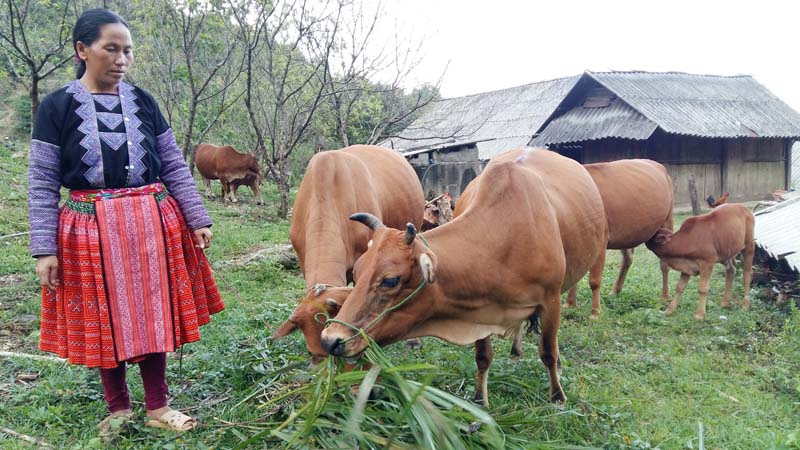
(HBO) – A smooth concrete road leads to Hang Kia commune, Mai Chau district, cows graze on the hill slope, and chickens run on houses’ yards. The picture demonstrates the better life of H’Mong ethnic people in Hang Kia.
has a sustainable livelihood from cow breeding after becoming
involved in a local poverty reduction project.
In 2012, Vang Y My, together with other women in Hang Kia 2 hamlet, received a
loan to buy a breeding cow under the project. My also received assistance in
the form of training from the project in taking care of her cow. After five
years, the cow gave birth to four calves, helping her family escape from
poverty. Now, she also raises chicken and pigs, and grows corn, plums and
edible canna to increase her income.
From 2016 – 2018, the project focused on improving infrastructure and living
conditions of H’Mong ethnic people in the area, which was an especially poor
area. A 50 cubic-metre water container in Thung Mai hamlet was built, ensuring
clean water supply for 53 local households, even in dry season.
Under the project, a communal house in Thung Man hamlet was put into use. The
commune road network was also significantly improved. Inter-hamlet roads in
Hang Kia commune were concretised at a cost of 1.7 billion VND. Concrete roads
to fields in Thung Mai, Pa Khom, Thung Man hamlets have also been made to
facilitate transport of materials and agricultural products, each costing
around 300 million VND (13,200 USD).
Kha A Pao, a member of Hang Kia commune’s development board said infrastructure
construction and livelihood assistance sub-project were particularly useful for
local residents. Thanks to roads, clean water supply stations and communal
houses built with support from the project, the living conditions of locals
have remarkably improved. All works were implemented effectively under close
monitoring and inspection. Livelihood assistance was made with careful study,
thus proving effective to reduce poverty in a sustainable manner.
Hang Kia commune is a disadvantaged area with low per capita income average,
and more than half of the commune’s household living under the poverty line.
The project has helped ease the difficulty and improve the living and
production conditions of H’Mong people in the commune. Dozens of poor
households now have stable livelihoods like Kha Y Do, Vang Y My in Hang Kia 2
hamlet, and Kha A Tru in Thung Mai hamlet.
The Department of Education and Training of Hoa Binh province held a conference on March 18 to review the performance of the "Safe and Happy School" Project and set out tasks for 2025. The project, funded by the Taiwan Fund for Children and Families (TFCF), aims to create a safe, inclusive, and supportive learning environment for students. The event saw the attendance of representatives from the TFCF and 26 beneficiary schools.
With over 70% of their workers being women, trade unions across industrial parks (IPs) in Hoa Binh have been actively safeguarding their legal rights and interests while implementing initiatives to improve their income and well-being.
In recent years, the Hoa Binh provincial General Hospital has continuously innovated itself and improved the quality of medical services to meet the increasing needs of local people. With substantial investments in infrastructure and modern equipment, along with a team of highly qualified doctors and nurses, the hospital has gradually established itself as one of the leading medical units in the Northwestern region and a trusted destination for healthcare for people inside and outside the province.
From mastering the fundamentals of programming to achieving national recognition, the Programming Club of the Le Van Tam Primary School (STAR LVT28) in Hoa Binh city has made remarkable strides in the field of robotics.
The Ho Chi Minh Communist Youth Union Committee and the Vietnam Youth Federation chapter of Hoa Binh province organised a programme on March 12 to launch the "Digital Literacy" movement and an online quiz on the resolutions of the Vietnam Youth Federation congresses at all levels, as well as the Politburo's Resolution No. 57-NQ/TW on breakthroughs in the development of science, technology, innovation, and national digital transformation.
As climate change grows more unpredictable, the development of production forests has become essential - not just for economic growth, but for safeguarding the environment and maintaining ecosystem balance. By boosting local incomes, curbing natural disasters, preventing soil erosion, and protecting water resources, these forests play a crucial role in sustainable development.



